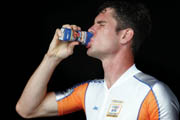
Three days before her 31st birthday, world championship Dutch swimmer and former Olympic medalist Inge de Bruijn won an Olympic gold medal in Greece earlier this year for the women's 50m freestyle. She also won a silver and two bronze medals in other events.
Part of her advantage may have been a result of her affiliation with PeptoPro Sports Peptide drink. The athletes from other countries likely consumed protein sports drinks containing amino acids and peptides, the building blocks of protein. They increase insulin secretion, a metabolite that assists transfer of glucose into muscle cells. There, glucose is synthesized into glycogen, which, as an energy source, is depleted in muscles during physical activity.
Regular sports drinks can require 20 hours to restore glycogen levels. Their proteins must first be digested into peptides and amino acids before they are of use to the athlete. However, Olympians and endurance athletes need to recover in less time than casual athletes (approximately 12 hours), since they may need to perform several times daily.
The Dutch teams' advantage was that it was privy to PeptoProSports drink, which was provided through DSM Food Specialties (Netherlands) at the request of the Netherlands Olympic Committee/Netherlands Sports Confederation. The sports drink contains unique PeptoPro[r] peptides, mostly the very small di- and tri-peptides. As a result, upon consumption, the peptides and amino acids require little to no digestion and quickly enter the bloodstream.
Research by Drs. Hans Keizer and Eric van Breda, NUTRIM, the Food and Toxicology Research Institute of the University of Maastricht (Netherlands) shows that PeptoProSports drink, which contains 4.2g PeptoPro, produces a 5% increase in sporting performance as compared to a control with the same carbohydrate levels and without PeptoPro peptides. Other published research, such as a study presented in the International Journal of Sports Medicine (2002), has shown that peptides in combination with carbohydrates increase re-synthesis of glycogen in the muscle after exercise by about 20%.
PeptoPro peptides also appear to repair damaged muscles and reduce muscle fatigue. Athletes feel less stiff or sore when they consume it after workouts.
Since some peptides and amino acids can exhibit an extremely bitter taste, DSM uses proprietary fungal enzymes to hydrolyze the milk protein casein into patented, mildly flavored hydrolysates that allow high levels of peptides to be used in a beverage without it tasting bad.
Besides bitter flavors, the DSM enzymes also remove allergenicity and improve solubility and drink transparency. Bioavailability of PeptoPro peptides are advantageous in that published research shows that milk-derived peptides are more bioavailable than free amino acids from other protein sources.
The peptides used in DSM's PeptoPro are now commercially available for use in other applications.
For more information:
DSM Food Specialties, Dr. Stefan Siebrecht (The Netherlands)
+0031 15 279 3014, Stefan.siebrecht@dsm.com, www.dsm.com